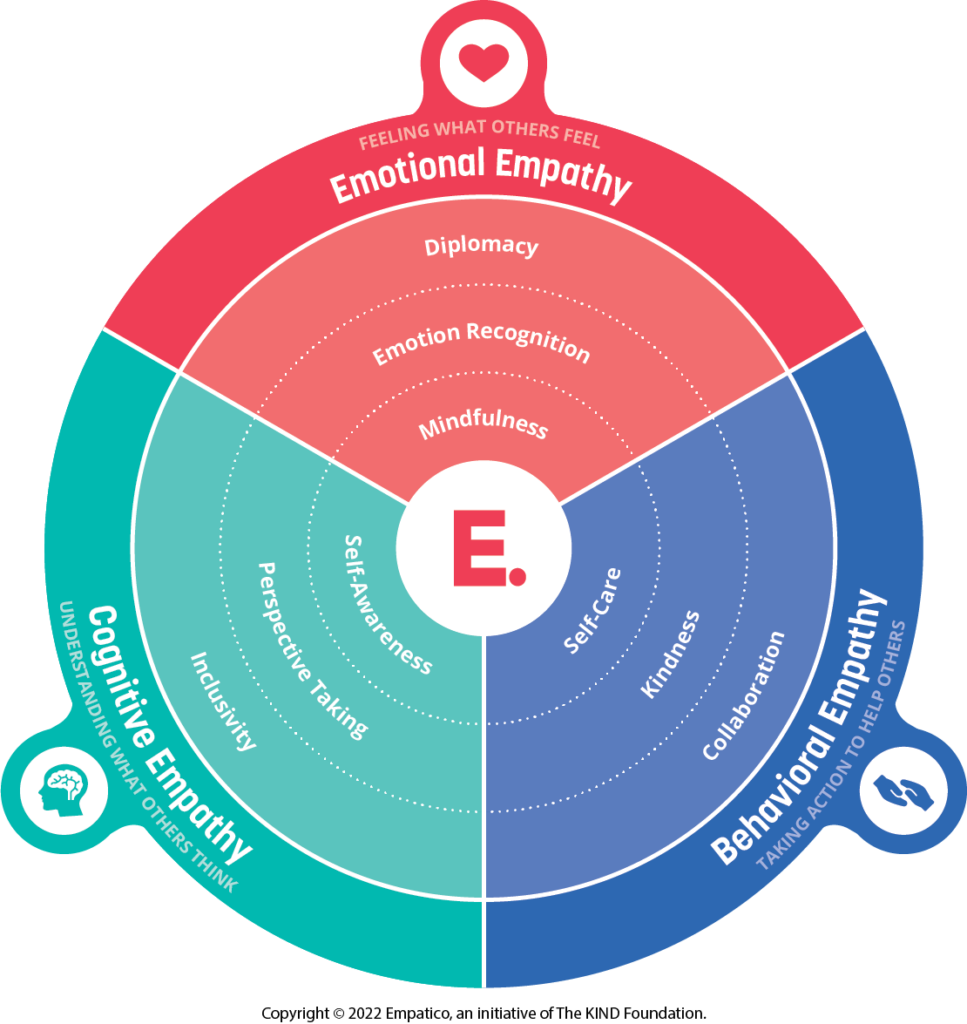The Empathy Framework promotes students’ healthy growth and the development of empathy in three areas: emotions, thoughts, and actions. Through framework-aligned activities and virtual exchange experiences, students can practice empathy towards themselves, towards others, and towards groups that are different from their own. Empatico partnered with Knology, a social science think tank, to develop the framework.


Emotional Empathy
Emotional Empathy is the ability to feel another person’s emotions, and helps build emotional connections among individuals and groups.
At the intrapersonal level is mindfulness, the ability to maintain a moment-to-moment awareness of our own thoughts and feelings. This includes skills like:
- Identifying and managing one’s own emotions
- Staying grounded in the present moment
At the interpersonal level, emotion recognition means recognizing the mood, feelings, or emotions of another person.
- Identifying other individuals’ emotions
- Naming emotions associated with different kinds of facial expressions
At the intergroup level, diplomacy helps us be more aware of other’s emotions, and helps us regulate and manage our emotions as we’re interacting with those who have different backgrounds, perspectives, or experiences from our own. This includes skills like:
- Understanding and being open to different ways of expressing emotions
- Managing emotions in group settings

Cognitive Empathy
Cognitive Empathy is the ability to understand a person’s feelings, perspectives, and what they might be thinking.
At the intrapersonal level, self-awareness is the ability to understand our own thoughts and values and how they influence our behaviors in different contexts. This includes skills like:
- Recognizing one’s own identity
- Understanding one’s biases
At the interpersonal level, perspective-taking is imagining the thoughts and experiences of another person. This includes skills like:
- Taking others’ perspectives
- Thinking critically about our assumptions of others
At the intergroup level, inclusivity is the capacity to recognize members of different groups as humans who have diverse perspectives and who are worthy of our empathy. This includes skills like:
- Showing curiosity by seeking others’ perspectives
- Demonstrating humility
- Identifying diverse norms

Behavioral Empathy
Behavioral Empathy is motivated by a basic desire to help or protect others, as well as oneself and one’s community.
At the intrapersonal level, self-care is a foundational skill, as we need to take time to care for ourselves in order to have the energy to help others. This includes skills like:
- Understanding and utilizing tools to support one’s own mental, phsyical, and emotional health
- Expressing emotions and needs
At the interpersonal level, kindness is all about helping others. This includes skills like:
- Expressing concern for others
- Treating others with respect
At the intergroup level, collaboration extends our kindness and willingness to help not only those in our own social group, but members of other groups.
- Practicing active and compassionate listening
- Problem solving to help others
- Showing courage and resolving conflicts